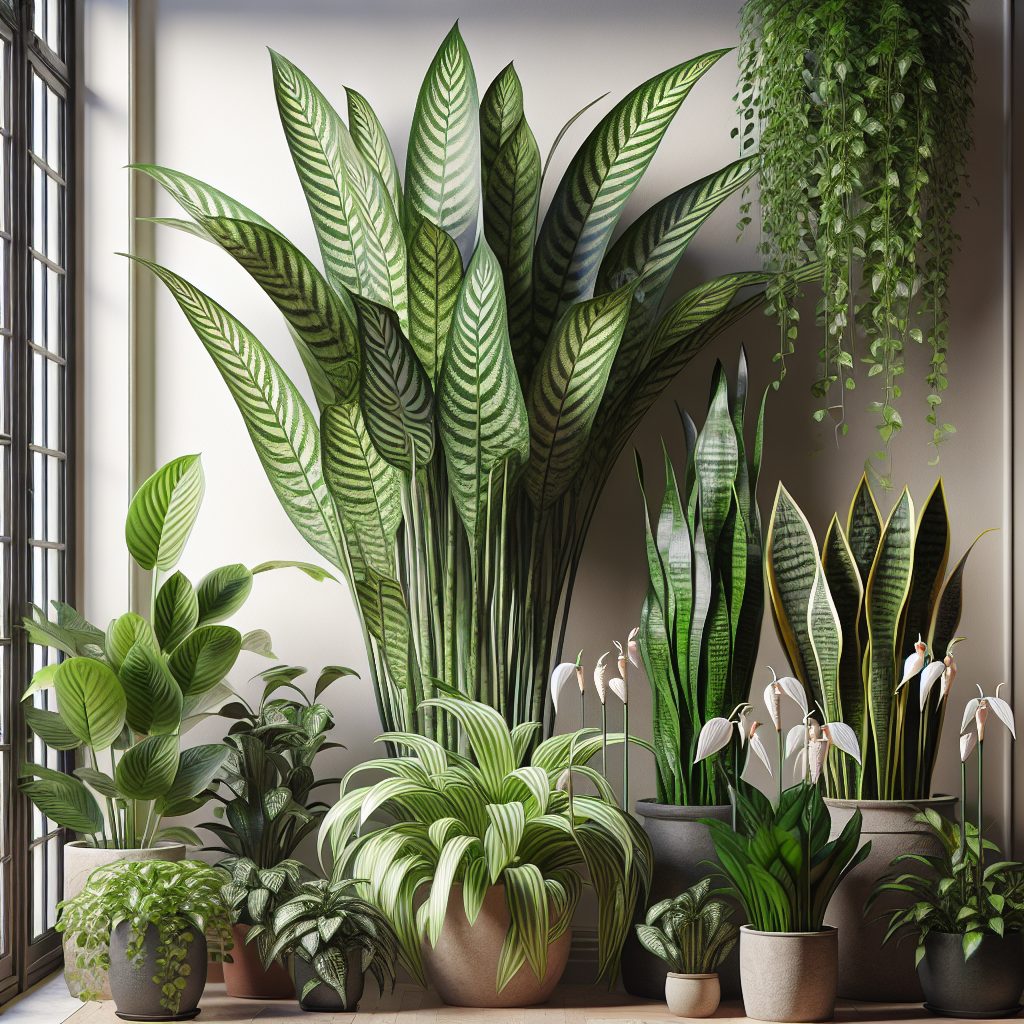
Indoor plants are a popular choice when it comes to keeping air clean and healthy inside the home. These house plants are more than just decorative pieces – they offer immense health benefits for our environment. All plants act as natural air cleaners due to a natural process called photosynthesis in which plants take in carbon dioxide from the air and emit oxygen, meaning that every plant has a role in purifying our indoor air. In addition, many plants absorb harmful volatile organic compounds, pollutants, and allergens which can get trapped indoors.
When contemplating if indoor plants are the right choice for a home, there are several factors to consider before making a purchase. Different varieties of plants have different benefits, and it’s important to do a bit of research to figure out which plants would best rid the air of pollutants and allergens. Additionally, it’s always important to know the proper care instructions for any type of houseplant. With the right selection and care, indoor plants can not only add beauty and decor to a home, but offer welcomed relief to their inhabitants from airborne contaminants. In the next section, we’ll discuss some tips for selecting the right varieties of indoor plants as well as learn more about the specific benefits they provide.
Key Takeaways
1. A majority of popular air-purifying plants are effective in clearing volatile organic compounds from the air, which can be caused by furniture, cleaning products, and air fresheners.
2. Common houseplants such as spider plants and English ivy are capable of removing formaldehyde from the air.
3. The moisture generated from indoor plants can also reduce dust in the air.
4. Adding a variety of plants to your home is a great way to increase oxygen levels for healthier air circulation.
5. Plants can also be beneficial for psychological wellness, reducing stress levels and making your home a more pleasant environment.
How do Indoor Plants Help Clean Air?
Indoor plants are a great way to improve air quality. Not only do they provide a natural source of oxygen but they also filter out pollutants and can help reduce the respiratory symptoms associated with them. Research has found that plants can absorb carbon monoxide, benzene and formaldehyde from the air, making it healthier.
What are the Benefits of Having Houseplants?
Aside from their ability to help clean the air, indoor plants provide numerous other benefits, including:
- Reduce stress – Studies have shown that having plants in your home can have a calming effect, making it easier to relax.
- Prevent illness – Studies have also found that indoor plants reduce the risk of asthma and allergies by eliminating pollutants in the air.
- Promote creativity – Plants have been found to aid in creative problem solving and decision making by providing a pleasant environment.
- Increase productivity – Plants can provide the perfect balance of energy and relaxation in the home or office, helping to increase focus and concentration.
- Make a space feel ‘loved’ – Plants add a feeling of warmth and cheerfulness to a space, creating a cozy atmosphere.
What Types of Houseplants are Best for Cleaner Air?
There are many different types of houseplants that are effective at improving the air quality. The following are some of the most effective air-purifying plants:
- Spider Plant – The spider plant is known for its ability to absorb pollutants such as formaldehyde, carbon monoxide and xylene.
- Peace Lily – This plant is excellent at removing not only pollutants but also a variety of bacteria.
- Dracaena – This plant is excellent for removing pollutants such as benzene, formaldehyde and trichloroethylene.
- English Ivy – The English Ivy is known for removing mold spores from the air, making it excellent for people suffering from allergies.
- Ficus – The Ficus is great at removing formaldehyde, benzene and trichloroethylene from the air, making it an excellent choice for those with respiratory issues.
How to Best Care for Indoor Plants?
Caring for indoor plants is easier than it seems. Here are a few tips to keep in mind when caring for your houseplants:
- Give the plant lots of sunlight – Most houseplants require at least 4-6 hours of direct sunlight daily.
- Water regularly – Plants need water to survive, so be sure to check the soil often and water when needed.
- Check for pests – Make sure to regularly inspect your plants for pests or disease, as these can quickly spread to other plants.
- Feed the plants – Feed your plants with a water-soluble fertilizer once a month, to ensure they grow and thrive.
- Keep the temperature constant – Make sure the room temperature does not drop below 60°F, as this could harm the plants.
What are the Best Practices for Keeping Indoor Air Clean?
In addition to keeping indoor plants, there are also a few other things you can do to ensure that your indoor air is as clean as possible. Here are a few of the best practices when it comes to air quality:
- Reduce dust – Regularly dust and vacuum to reduce the amount of dust particles in the air.
- Change filters – Make sure to regularly change air filters, as this will ensure that your air is being constantly filtered.
- Open windows – When possible, open windows and allow fresh air to circulate throughout the home.
- Avoid scented products – Scented candles, air fresheners and other scented products emit pollutants into the air, so avoid using them as much as possible.
- Keep indoor plants – As mentioned above, indoor plants can help reduce pollutants and improve air quality.
Conclusion: What are the Top Tips for Maintaining Clean Air with Indoor Plants?
1. Give plants plenty of sunlight and water regularly.
2. Check for pests often.
3. Feed your plants a water-soluble fertilizer monthly.
4. Keep the room temperature consistent.
5. Reduce dust build-up with regular vacuuming and dusting.
6. Replace air filters when needed.
7. Open windows for fresh air circulation.
8. Avoid scented products.
How do indoor plants clean the air?
Indoor plants are able to absorb volatile organic compounds (VOCs), such as formaldehyde, benzene, and trichloroethylene, from the air. They absorb the VOCs through their leaves and stems and break them down into simpler molecules which are then released as oxygen, meaning that the air around the plant is cleaner and fresher.
What are the most effective indoor plants for air purification?
Some of the most effective indoor plants for air purification include Peace Lily, Spider Plant, English Ivy and the Snake Plant. However, this can vary depending on the type of air pollutants in the environment.
Do I need to buy a lot of indoor plants to purify my air?
No, you do not need to buy a lot of indoor plants to purify your air. As long as the indoor plants you choose are capable of absorbing the pollutants in your air, you should be able to achieve adequate air purification with just a few plants.
Do indoor plants need special care?
Indoor plants do need some special care to ensure they remain healthy. This includes providing adequate sunlight and water, as well as using the right type of soil and fertilizers. Without proper care, the indoor plants will not be able to properly purify your air.
Do indoor plants need to be pruned regularly?
Pruning is not necessary for indoor plants, but it can help them stay healthy and strong. Pruning helps promote new growth and can also decrease the amount of maintenance required to keep the plant looking and performing its best.
Are indoor plants safe for pets?
Some indoor plants are safe for pets, while others can be dangerous. Before bringing an indoor plant into your home, be sure to check if it is safe for your pet. In particular, lilies and several species of ferns can be toxic to cats and dogs.
Do indoor plants need special lighting?
Most indoor plants do need some extra lighting to thrive, depending on the amount of natural daylight they receive. LED lights are a good option, as they provide enough light while also using less energy.
Do indoor plants need to be repotted regularly?
Yes, indoor plants do need to be repotted regularly. Over time, the roots of indoor plants can become crowded and will require repotting into a larger pot to ensure healthy growth and development.
Do indoor plants need to be fed fertilizer?
Fertilizer can be beneficial to indoor plants, especially when they are in a growth cycle. The type of fertilizer you use should depend on the type of plant you are growing.
Do indoor plants need special humidity?
Many indoor plants require high humidity levels in order to thrive. If the air in your home is dry, you can help to maintain a higher humidity level by misting the plants or using a humidifier close to them.
Final Thoughts
Indoor plants can be an effective way to clean the air in your home while also providing a touch of nature and offering a beautiful aesthetic. With the right care and maintenance, they can thrive for years to come and make your home a healthier and happier place to live.
The type of indoor plants you choose should be based on your air quality and the level of maintenance you are willing to provide. When done correctly, indoor plants can be a great addition to any home and provide measurable benefits to your health and wellbeing.



